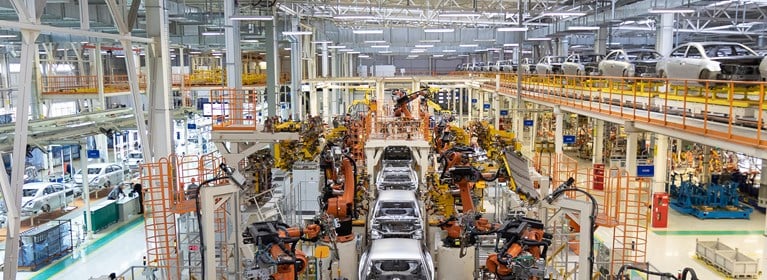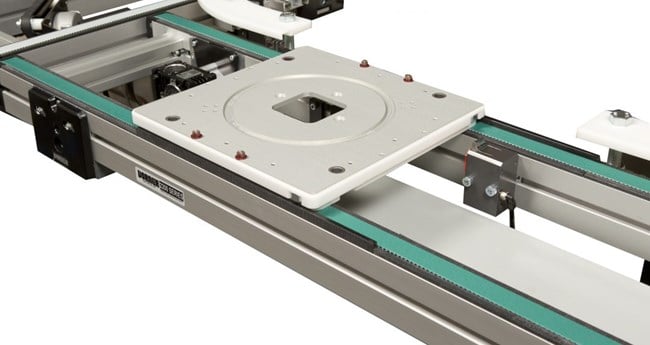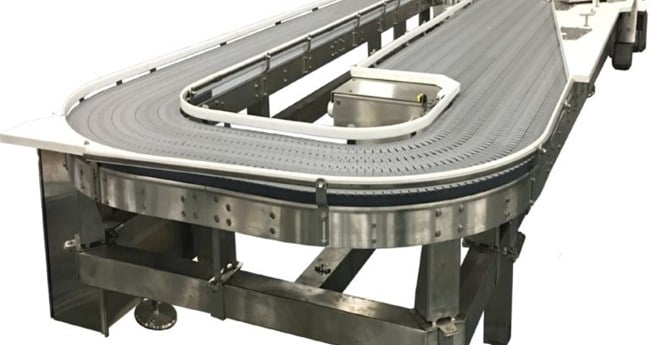The automotive industry, with its high delivery requirements and often tight margins, has experienced tremendous growth over the past few decades. Conveyors can help ease these demands by moving heavy and bulky parts quickly and efficiently, improving safety in the factory and increasing productivity. To remain profitable and to meet the ever-increasing demands of customers in the automotive industry, effective and efficient automated production flow solutions are essential.
growth over the past few decades. Conveyors can help ease these demands by moving heavy and bulky parts quickly and efficiently, improving safety in the factory and increasing productivity. To remain profitable and to meet the ever-increasing demands of customers in the automotive industry, effective and efficient automated production flow solutions are essential.
Industrial and automation conveyors — also known as industrial conveyor belts, industrial conveyor systems, and industrial conveyor belt systems — move parts and products from one place to another during specific phases of the production cycle, making them a crucial component. Industrial conveyors serve every stage of manufacturing, from inspection and production to assembly and packaging. In the automotive industry, conveyors are particularly useful in accumulation, assembly automation, and part handling. Either fabric belted or modular belted, both types of conveyors increase efficiency, reduce costs, and ensure smooth operations.
Contact our Automotive Conveyance Team Today
A pallet handling conveyor, or pallet assembly conveyor, moves individual products on product carriers such as belts, chains, skate wheels, or rollers. Each pallet can be modified for a variety of environments, ranging from applications such as small electrical component assembly to the manufacturing of engine components. A pallet conveyor system creates specific routing paths for certain products throughout an entire manufacturing process. Based on unique pallet identification, specific routing paths can be created for each product type.
Learn About Dorner's Pallet Conveyor Systems
An accumulation conveyor is a system used to control the flow of products along a production line. By using an accumulation conveyor, manufacturers can ensure that products are released single file, at the proper rate, and that the production line runs smoothly. Machines will have a steady supply of product to process by providing buffers so that even if one machine goes down, the rest of the line keeps working.
As soon as these resources become available, the system releases the next queue of products. A high-throughput operation can benefit significantly from accumulation conveyors because they allow processes to be slowed down or sped up at different points within the same operation, enabling operation flexibility in case of bottlenecks.
Learn More About Garvey's Accumulation Systems
Metering systems typically used for moving products from a mass flow to parallel machines are similar to traffic lights — the products have to stop at each station before moving on to the next one. This is slow and inefficient, and the machines at the end of the line often sit idle while waiting for products. Garvey's on-demand distribution systems operate like a superhighway — the products circulate continuously until they encounter an empty machine. Utilizing patented accumulation technology, on-demand distribution systems enable you to keep your production line running and increase throughput by feeding parallel processing machines as needed. It is designed so that no machine is ever waiting for a product, and a failure in one machine does not impact the rest of the line.
Learn More About Garvey's Distribution Systems
In addition to being wear-resistant, belt conveyors can transport sharp-edged products. A Dorner 2200 series conveyor is resistant to cutting and allows for the drainage of coolants and oils, whereas urethane belts can be damaged by sharp edges on metal parts or scraps.
Benefits of Industrial Conveyors
With floor space in automotive manufacturing and packaging facilities continuing to shrink, it is imperative that conveyors be able to make tight turns in and around existing equipment. For small part transfer in and around tight spaces, along with pallet assembly integrations, Dorner's flexible chain conveyors are designed to move products horizontally and vertically, improving product movement capabilities when floor space is limited.
benefits of flexmove conveyors

 growth over the past few decades. Conveyors can help ease these demands by moving heavy and bulky parts quickly and efficiently, improving safety in the factory and increasing productivity. To remain profitable and to meet the ever-increasing demands of customers in the automotive industry, effective and efficient automated production flow solutions are essential.
growth over the past few decades. Conveyors can help ease these demands by moving heavy and bulky parts quickly and efficiently, improving safety in the factory and increasing productivity. To remain profitable and to meet the ever-increasing demands of customers in the automotive industry, effective and efficient automated production flow solutions are essential.
 EMEA - EN
EMEA - EN





